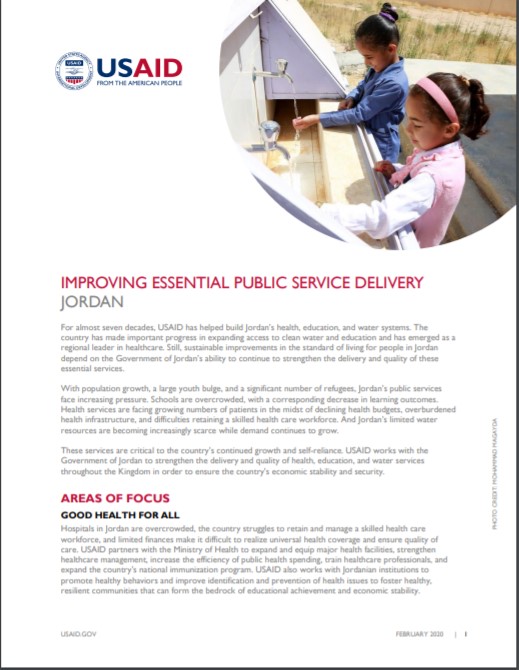Speeches Shim
For almost seven decades, USAID has helped build Jordan’s health, education, and water systems. The country has made important progress in expanding access to clean water and education and has emerged as a regional leader in healthcare. Still, sustainable improvements in the standard of living for people in Jordan depend on the Government of Jordan’s ability to continue to strengthen the delivery and quality of these essential services.
With population growth, a large youth bulge, and a significant number of refugees, Jordan’s public services face increasing pressure. Schools are overcrowded, with a corresponding decrease in learning outcomes. Health services are facing growing numbers of patients in the midst of declining health budgets, overburdened health infrastructure, and difficulties retaining a skilled health care workforce. And Jordan’s limited water resources are becoming increasingly scarce while demand continues to grow.
These services are critical to the country’s continued growth and self-reliance. USAID works with the Government of Jordan to strengthen the delivery and quality of health, education, and water services throughout the Kingdom in order to ensure the country’s economic stability and security.
AREAS OF FOCUS
GOOD HEALTH FOR ALL
Hospitals in Jordan are overcrowded, the country struggles to retain and manage a skilled health care workforce, and limited finances make it difficult to realize universal health coverage and ensure quality of care. USAID partners with the Ministry of Health to expand and equip major health facilities, strengthen healthcare management, increase the efficiency of public health spending, train healthcare professionals, and expand the country’s national immunization program. USAID also works with Jordanian institutions to promote healthy behaviors and improve identification and prevention of health issues to foster healthy, resilient communities that can form the bedrock of educational achievement and economic stability.
ACCESS TO QUALITY EDUCATION
While Jordan has made progress in increasing access to quality education, it remains uneven, and overburdened school systems leave many children underprepared to participate in an increasingly competitive knowledgebased economy. USAID and the Ministry of Education work together to expand and rehabilitate schools, prepare and support teachers and staff to foster supportive learning environments, and provide educational opportunities for out-of-school children and youth. This ensures that children and youth throughout Jordan can get the knowledge and skills they need to build brighter futures for themselves and their communities.
SUSTAINABLE WATER MANAGEMENT
Jordan is one of the most water-scarce countries in the world, and half of the country’s water supply is lost due to leaks, illegal connections, and other causes. USAID partners with the Government of Jordan and the private sector to address Jordan’s water management challenges by developing Jordan’s water and wastewater infrastructure, implementing policy reform and strengthening governing institutions, and increasing water conservation (especially in the agriculture sector, which consumes half of Jordan’s overall water supply).
NOTEWORTHY ACHIEVEMENTS
- Since 2002, USAID has renovated and modernized 349 health facilities across the Kingdom, including Princess Rahma Pediatric Hospital, the only pediatric referral hospital for the four northern governorates, which serves nearly 60,000 children each year. USAID’s expansion and renovation of the hospital expanded its capacity by 35 percent and provided it with the equipment to deliver critical health services for children of all nationalities.
- From 2007 to June 2020, USAID expanded equitable access to education by building, rehabilitating, and expanding 377 schools. This work, conducted in conjunction with teacher training, reduces overcrowding in the classroom and ensures accessibility for students with disabilities and safe classroom environments conducive to student learning throughout the country.
- USAID has improved fresh water and sanitation services by building water treatment plants, water networks, and pumping stations, as well as wastewater treatment plants and wastewater networks. This includes the construction of the Zara Ma’in Water Treatment Plant, critical to providing drinking water to an estimated 2.6 million residents in Amman; and As Samra Wastewater Treatment Plant, which treats 70 percent of the Jordan’s wastewater.
- USAID has convened donors to coordinate efforts to expand access to services in Jordan, including through establishing multi-donor accounts to support the Ministry of Health to provide health services for Syrian refugees and the Ministry of Education to give access to formal schooling for children of all nationalities, and through providing technical assistance to upgrade water and wastewater infrastructure in partnership with the Government of Jordan and the French Development Agency.


Comment
Make a general inquiry or suggest an improvement.